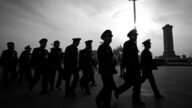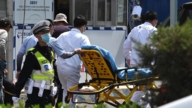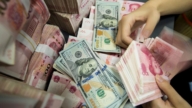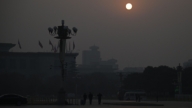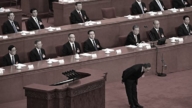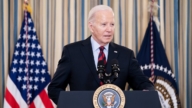【新唐人2014年01月10日訊】30年前,中共國務院總理趙紫陽曾給「香港大學學生會」回信,承諾給香港民主。這封信最近被曝光。那麼,當年參與寫信的學生,現在香港的中堅力量,他們怎麼看待香港的民主現狀呢?曾任趙紫陽政治秘書的鮑彤先生,如何分析北京至今不能兌現承諾的原因呢?請看詳細報導。
9號,香港《明報》報導,他們在翻閱「香港大學學生會」評議會的歷年記錄時,發現了1984年1月學生會寫給時任中共國務院總理趙紫陽的信,學生會要求香港回歸後能夠普選特首,而趙紫陽在回信中承諾要「民主治港」。
當年參與寫信的1983年「香港大學學生會」外務副會長葉建源,現在是香港立法會的議員。
香港立法會議員葉建源:「當時香港大學的同學在1983年的時候已經開了會,也通過了一些有關香港前途的一些立場。在1983年年底,就決定要寫一封信給趙紫陽,表示我們必須實行高度的自治,而高度的自治就應該以民主為基礎。」
1984年5月底,趙紫陽回信給「港大學生會」。在信中,他以中共總理身份承諾:「將來香港特別行政區實行民主化的政治制度,即你們所說的『民主治港』,是理所當然的」。
葉建源至今還記得同學們看到回信後的想法。
葉建源:「他的表述很清楚。他贊成了香港大學學生會的同學在給他的信裡頭所表達的內容,所以當時我們就感到這個是很好的一個回覆。」
在那之後5年,1989年「六四」學生運動中,趙紫陽因同情學生、反對武力鎮壓,而被迫下臺。而香港在1997年回歸中國後,針對民主、法治、特首普選等重大問題,民間連年爆發上萬人、甚至幾十萬人的大遊行,反對中共當局壓制香港的自由、民主。
回首30年來香港的民主之路。葉建源認為,香港的民主還徘徊十字路口,當年的承諾仍未兌現。
葉建源:「因為在過去非常長的一段時間裏頭,就是說要循序漸進。那這個循序漸進過了30年了,這個已經不能夠再用作為藉口的。他這個莊嚴的承諾30年後還不能實現的話,那就太失望了。」
曾任趙紫陽的政治秘書的鮑彤認為,趙紫陽當時是想從上而下的實行政治體制改革,讓中國大陸走出一黨專制的陰影,但是他失敗了。所以直到30年後,中共當局還不能兌現對香港的承諾,就是因為這個體制的原因。
鮑彤:「中國的命運跟香港的命運是在一起的。當中國本身還在毛澤東的一黨專制這種體制底下生活的時候,所謂港人治港、所謂一國兩制,實際上是不可能實現。香港爭取民主的過程,跟中國大陸實現民主的過程應該是一致的,互相支持的。」
在剛剛過去的香港新年大遊行中,有大約3萬人為「普選特首」、「拒絕中共干預」等走上街頭抗議。
葉建源:「現在我們已經有了一個很明確的日期,那就是2017年特首要普選。這個才能對得起30年前趙紫陽用國務院總理的身份來寫這封信的。」
有「東方明珠」美譽的香港,在中國清朝期間,因第一次鴉片戰爭清朝戰敗,簽訂《南京條約》,而在1842年割讓給英國。1997年7月1號,主權移交回中國,按照中共元老鄧小平所謂「一國兩制」成為香港特別行政區,實行特首制。
採訪編輯/唐音 後製/孫寧
Zhao Ziyang Promised Hong Kong Democracy 30 Years Ago
Thirty years ago, in a letter to the Hong Kong University Students’
Union, the Chinese Communist Premier Zhao Ziyang promised
democracy in Hong Kong.
This letter was recently found.
Those students who wrote to Zhao Ziyang have become the
backbone of Hong Kong.
What is their opinion regarding the democracy of Hong Kong today?
Zhao Ziyang’s Policy Secretary Bao Tong analyses the reasons
why this promise has not been fulfilled.
Please follow us on this report.
In the January 9 report of Hong Kong newspaper, Ming Pao:
a record of Hong Kong University Students’ Union in January
1984 showed a letter addressed to Premier Zhao Ziyang
regarding the election of Hong Kong Chief Executive after
reunification.
In his reply, Zhao Ziyang promised a democratic
administration in Hong Kong.
Member of the Legislative Council of Hong Kong IP Kin-yuen,
then Vice President of the student union, was then one of the
participants drafting the letter to Zhao Ziyang.
IP Kin-yuen, Hong Kong Legislative Council Member:
“In 1983, students at the University of Hong Kong had adopted
a number of resolutions about the future of Hong Kong,
and decided to write a letter to Zhao Ziyang, demanding that
we must exercise a high degree of autonomy on the basis of
democracy."
By the end of May 1984, Zhao Ziyang replied and promised
as the Premier:
“The HKSAR is granted the right to practice a democratic political
system in the future, i.e., the democratic administration."
IP Kin-yuen still remembers how students reacted to
Zhao’s reply.
IP Kin-yuen: “His reply was very clear.
He approved the principles the students had expressed.
We felt encouraged by his letter."
In the five years after that, Zhao Ziyang was forced to step down,
because of his sympathy for the students in 1989 student
movement and his opposition to the military repression.
The principles of democracy, rule of law, and the election of
Chief Executive after Hong Kong’s handover to China in 1997
have urged tens of thousands and even hundreds of thousands of
Hong Kong residents to stage protests opposing the suppression
of the Communist regime every year.
Looking back on the 30 years of Hong Kong’s road to
democracy, IP Kin-yuen believes that Hong Kong is still
hovering at the crossroads and the promises remain unfulfilled.
IP Kin-yuen: “It was said to take a gradual progress.
But, 30 years have passed.
This so called gradual progress excuse is no longer plausible.
It is disappointing that this solemn promise is still yet to be
realized 30 years later."
Zhao’s former political secretary Bao Tong believes that:
Zhao Ziyang was trying to implement political reform from
the top down to get China out of the one-party dictatorship,
but he failed.
It is the dictatorship that failed to honor their commitments to
Hong Kong in the past 30 years.
Bao Tong: “Hong Kong’s destiny is tied to the destiny of China.
With Mao Zedong’s one-party dictatorship,the so-called
“Hong Kong people administering Hong Kong" and
the so-called “one country, two systems" are practically impossible.
Hong Kong and China would share the same path in the process
to democracy and be supportive of each other."
In this past New Year Parade in Hong Kong, there were about
30,000 people that took to the street and called for a Chief Executive
by universal suffrage and opposed the regime’s intervention.
IP Kin-yuen: “Now we’ve set the date, that is,
a direct election for the Chief Executive in 2017.
That is to honor the letter 30 years ago written by
Premier Zhao Ziyang."
Hong Kong, known as the Pearl of the Orient, was ceded to Britain
in 1842 in the Treaty of Nanking after the Qing dynasty lost
the First Opium War.
On July 1, 1997, Hong Kong sovereignty was handed over to
China, by Margaret Thatcher.
According to Deng Xiaoping’s “one country, two systems,"
Hong Kong became a Special Administrative Region administered
by Chief Executive.
Interview & Edit/TangYin Post-Production/SunNing


